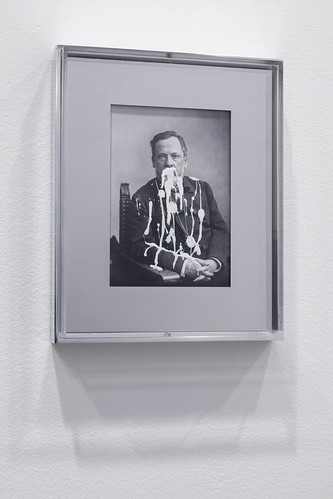Thursday, 11:58am
30 July 2020
A matter of (sour) taste

The Slavs and Tatars collective makes satirical exhibitions and installations that use pickling as a metaphor. By Gabriela Matuszyk

‘Pickle Politics’ is an eight-work cycle from collective Slavs and Tatars, writes Gabriela Matuszyk.
For the past thirteen years, this mysterious art / design collective has used visual research-led strategies to examine the complexities of Eurasia, which it describes as the geographical region between the former Berlin Wall and the Great Wall of China. When Slavs and Tatars are interviewed, they discuss the way their interdisciplinary work aims to challenge ‘prevalent modes of knowing’ through lectures, performances, publications and exhibitions. Using humour and allegories, they tell ‘stories that have not yet been heard’.
Slavs and Tatars, Make Mongolia Great Again, 2016.
Top. Coo Coo 4 Kumis, 2016. All artwork and design by Slavs and Tatars.

Slavs and Tatars started out with the intention of focusing on ‘those things we do not know’. Looking to Eurasia as a geographical anchor came from the desire to seek out types of knowledge that are ‘other’, as distinct from analytical, cerebral and rational. Its anonymous members claim that they are not interested in ‘publishing and reinforcing preconceived ideas or views’, so they adopt a cyclical approach to projects, with each work cycle lasting two to three years.
The collective follows the process of scholarly articulation – through research, writing and lectures – and subsequently the process of ‘disarticulation’ through exhibition-making; each exhibited piece is an encapsulation of this process. ‘Slavs and Tatars is a brief, not a name,’ states the group. ‘It doesn’t represent us. The brief is what we are doing.’
Installation view of Pickle Juice Sport at the Asia Culture Center, Gwangju, 2017.

‘Pickle Politics’ is an eight-work cycle from the collective. It tells stories of belonging, migration, political power shifts and the east / west divide through a range of mediums such as sculpture, installation and posters. Pickle Tits, for example, shifts ‘the representational value of cucumbers as male genitalia’ into female breasts. Slavs and Tatars asks its audience to reconsider the ‘soured relationship’ between rulers and public, which is often characterised as a nourishing one. Make Mongolia Great Again mocks the validity of Donald Trump’s 2016 presidential campaign slogan. Written out in Spanish over a map of Eurasia, the artwork references the Mongol Empire in Genghis Khan’s era, harking back to past greatness and an era that was shaped by violence, fear and genocide.
Installation view of To Turn at the 58th International Art Exhibition of the Venice Biennale, 2019. Photo: Luca Giardini. Courtesy: Kraupa-Tusdkany Zeidler, Berlin.
Installation view of Pickle Tits at the Westfälischer Kunstverein, Münster, 2018. Photo: Thorsten Arendt

Using the process of fermentation as a central metaphor, ‘Pickle Politics’ playfully explores the multifaceted nature of political arguments through the notions of the rotten, the spoiled and the soured. ‘Culturally, pickling has been considered a lowbrow practice that is cheap, accessible and easy,’ Slavs and Tatars has said, ‘yet it is complex and transfigurative in its process.’ In times when false dilemmas are at the centre of the political vernacular, pickling offers an alternative: it preserves through a process akin to rotting, and it challenges the binary notion that these two processes are mutually exclusive.
Installation view of Brine and Punishment at the 58th International Art Exhibition of the Venice Biennale, 2019. Photo: Luca Giardini. Courtesy: Kraupa-Tusdkany Zeidler, Berlin.

An example of using the process of fermentation as an anti-binary metaphor is demonstrated in Afteur Pasteur, which presents a portrait of French scientist Louis Pasteur (discoverer of pasteurisation) dripping with milk (in a nod to the ‘Got Milk?’ ad campaign). Pasteurisation is the process of sterilisation that eradicates bacteria in the name of safety; all microbes are treated as foreign agents or enemies that need to be repelled. Pickle Juice Sport manifests the phobia against the foreign through the medium of a PVC curtain – a physical division between cultural differences. The curtain acts as a signifier of Slavic defeatism in light of positivism of the US, where pickle juice is repurposed as a new sports performance enhancement drink; in the east, it is considered a hangover cure.
Afteur Pasteur, 2016.
Poster for the Pickle Bar, Berlin, 2020.

The Pickle Bar, which is the latest embodiment of the Pickle Politics cycle, aims to put Slavs and Tatars’ politically engaged conversations and questions to a wider space through a public programme. The bar will be launched at the Berlin Art Week, 11-13 September 2020, in collaboration with KW Institute of Art, during which the Georgian rituals of the Tamada (a toastmaster) will be explored. During the ‘chamber drinking ritual’, guests will be offered a selection of fermented drinks and bites, plus, in the collective’s words, ‘the sharp tongue of a Tamada guiding them through the afternoon and evening’.
Gabriela Matuszyk, designer, writer, educator, London
Eye is the world’s most beautiful and collectable graphic design journal, published for professional designers, students and anyone interested in critical, informed writing about graphic design and visual culture. It is available from all good design bookshops and online at the Eye shop, where you can buy subscriptions and single issues.




